Empire of Genghis Khan and Khorezm. The beginning of the confrontation
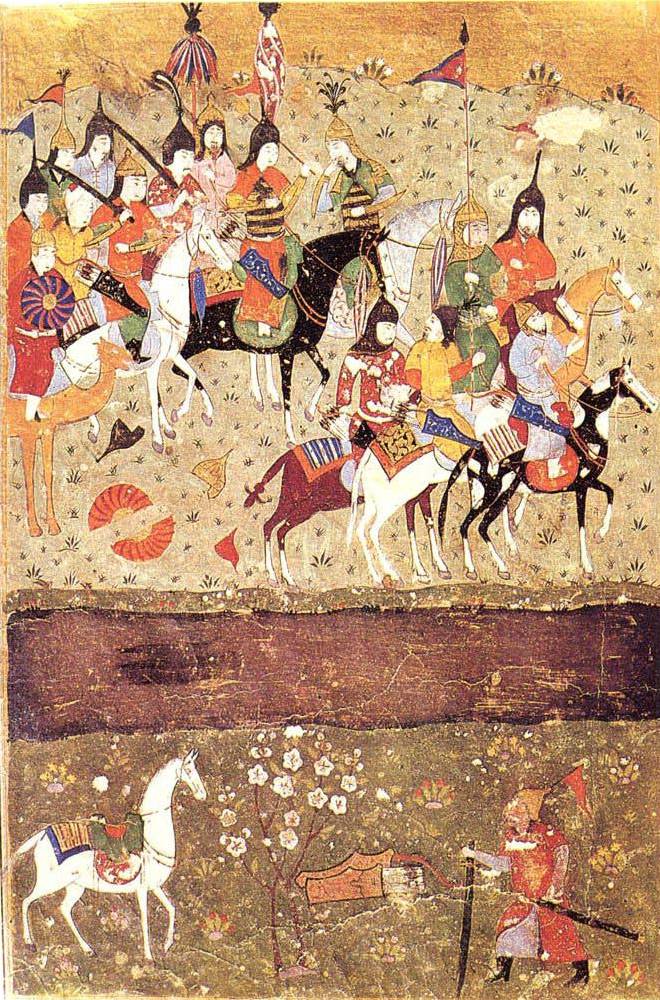
State of Khorezmshahs
The name “Khorezm” is very ancient, known from the 8th – 7th centuries BC. There are several versions of its origin. According to the first, this is “feeding land”, supporters of the second believe that this is “low” land, and S.P. Tolstov believed that it should be translated as "Country of Hurrit" - Hvarizam.
The armies of many conquerors passed through these lands, the last were the Seljuks, whose powers included the territory of Khorezm. But the last of the Great Seljuks, Ahmad Sanjar, died in 1156. The weakened state, no longer able to keep the outskirts submissive, crumbled to pieces.
In 1157, Khorezm gained independence, and a dynasty came to power, the penultimate representative of which destroyed the country, and the latter fought like a hero (and became the national hero of four countries), but, alas, came to power too late.
The lands subject to the Khorezmshahs then extended from the Aral Sea to the Persian Gulf, and from the Pamir to the Iranian Highlands.
The extremely advantageous geographical position guaranteed a stable income from transit trade. Samarkand, Bukhara, Gurganj, Ghazni, Tabriz and other cities were famous for their artisans. Agriculture flourished in numerous fertile valleys and in an oasis in the lower reaches of the Amu Darya. The Aral Sea was rich in fish. Huge herds and flocks of cattle grazed in the boundless steppe. The Arab geographer Yakut al-Hamawi, who visited Khorezm shortly before the Mongol invasion, wrote:
Victories and Challenges
The state of Khorezmshahs reached its heyday under Al Al-Din Mohammed II, who successively defeated the Gurtsky Sultanate and the Karakit Khanate, after which he appropriated the title of "Second Alexander" (Macedonian).
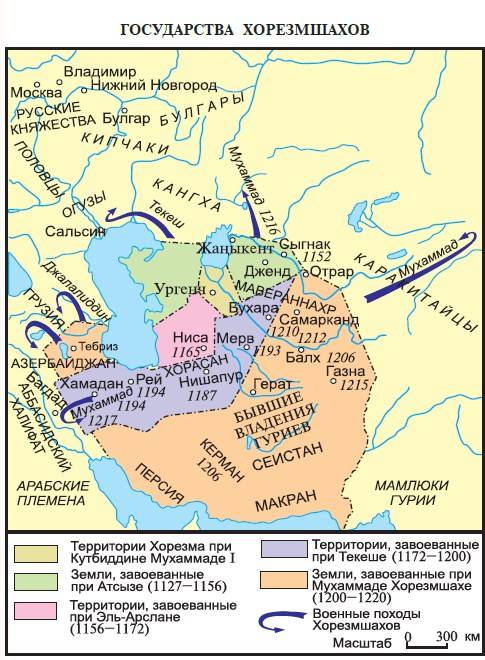
At his court, hostages from the sons of the rulers of neighboring countries constantly lived until 27. In 1217, he even tried to lead his army to Baghdad, but because of the early winter, his army was unable to overcome the mountain passes. And then there was alarming information about the appearance of the Mongol troops at the eastern borders of Khorezm, and Muhammad was not up to Baghdad.
The first capital of Muhammad II was Gurganj (now the Turkmen city of Köneurgench), but then he moved it to Samarkand.
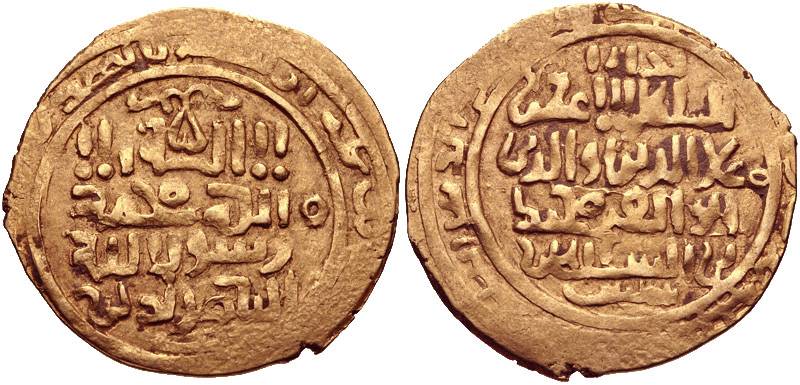
However, all this was only a beautiful external wall covering an unsightly picture of internal discord and disorder.
One of the problems of Khorezm was a kind of dual power. Terrible from the Khorezmshah, Muhammad was forced to reckon with the opinion of his mother, Terken-Khatyn, a representative of the influential kind of “ashira,” whose men held senior military and administrative posts.
- wrote Mohammed al-Nasawi.
One of the few women in the Muslim world, she had a lakab (exalting the epithet as part of the name) Khudavand-i jahan - “Lord of the world.” She also had her own personal tugra (a graphic symbol, which is both a seal and a coat of arms) for decrees: "The protector of peace and faith, Great Terken, mistress of women of both worlds." And his motto: “I seek protection only from Allah!”
When Muhammad moved his capital to Samarkand (escaped from strict mother?), Terken-Khatyn stayed in Gurganj, where she had her own yard, no worse and no less than her son, and continued to actively intervene in all affairs of the state. An-Nasawi maintained that if two different decrees were received from her and from the Khorezmashah on the same case, the one that came later was considered “correct”.
Turken-Khatyn hated the oldest son of Muhammad - Jalal ad-Din, who was born from the Turkmen woman Ai-Chichek - so much so that when, during the Mongol invasion, the eunuch Badr ad-din Khilal offered her to run to the new Khorezmshah, she replied:
(Shihab ad-Din Muhammad al-Nasawi, "The Biography of Sultan Jalal ad-Din Mankburn.")
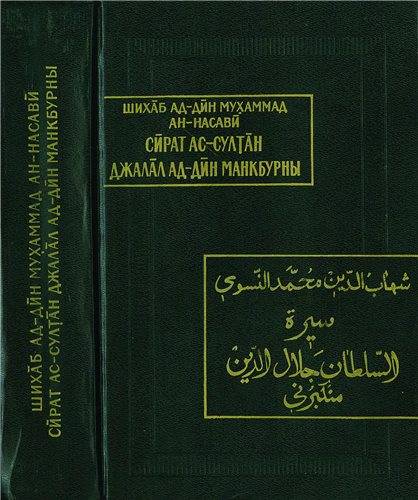
As a result of the intrigues of Terken-Khatyn, the youngest son of Muhammad, Qutb ad-Din Uzlag Shah, was declared the heir to the throne, whose only merit was an origin from the same kind as herself. And Jalal ad-Din, who demonstrated great military successes from a young age, received the Afghan Gazna, and his father did not let him go there, because he did not trust and was afraid of a conspiracy.
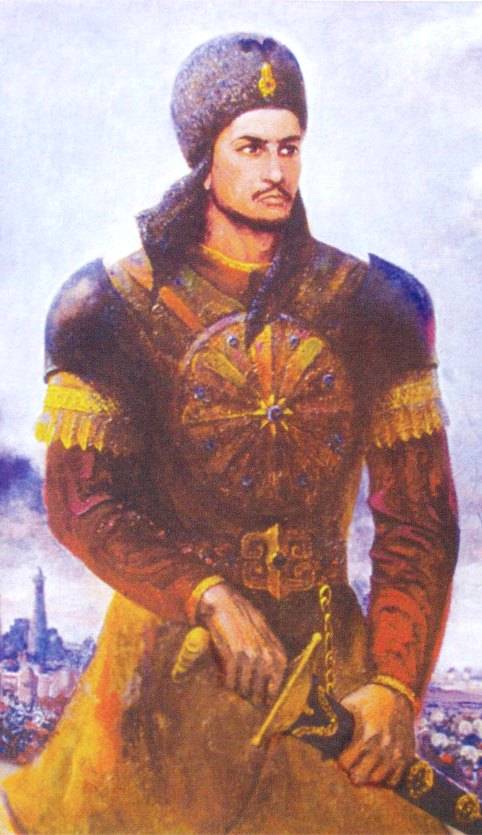
An alarming sign for a historian studying Khorezm in the 12th-13th centuries is certainly information about the army of this state, which was now based on mercenaries - Turkmens and Kangles. Such troops can still be used in conquering wars with weaker opponents, but it is hardly reasonable to rely on them in the event of a severe war with a strong enemy on their territory. They have nothing to protect in a foreign land for them, and there is no hope of rich prey.
Another sign of tension is the uprisings in Samarkand and in the recently annexed Bukhara. And in Isfahan (western Iran) and Rey (northern Iran) there were constant clashes between the Shafiites and Hanafites. And here still in the east the previously weak and fragmented nomadic tribes came into motion, surprising and frightening the neighbors with their victories. So far, the Mongols fought in the east, but it was clear to all more or less intelligent people that someday they would move west.
On the eve of the disaster
The first diplomatic contacts between the Khorezmians and the Mongols were established in 1215, when the ambassadors of Muhammad II visited Genghis Khan on the eve of the assault on Beijing, and could be convinced of the power of his army.
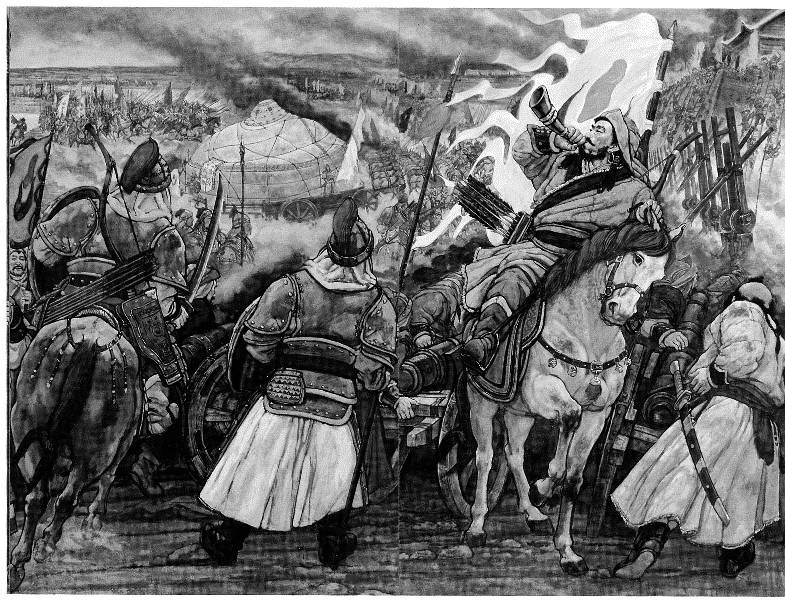
There was no common border between Khorezm and the state of Chinggis, and the conqueror assured the ambassadors that he was not seeking war with his western neighbors, counting on good-neighborly relations and mutually beneficial trade. But, almost immediately, he launched an attack on the west - not yet on Khorezm, on its neighbors. Subedei set off on a campaign against the Desht-i-Kipchak tribes, Jochi opposed the Tumats and Kirghiz, and Jebe attacked the Kara-Khitan. By the end of 1217, they were all crushed, and now a clash of young (state of the Mongols) and old (Khorezm) predators became inevitable.
About Subedai and Jab on behalf of Jamuhi, it is said in “The Secret Legend of the Mongols”:
Their foreheads are of bronze,
And the snouts are steel chisels.
Shiloh is their language
And the heart is iron.
With a whip they serve swords
Eating pretty dew to them,
Riding in the winds.
Human meat - their grub marching,
In the days of slaughter, human meat is eaten.
They lowered them from the chain. Isn't it a joy?
They waited for a long time on a leash!
Yes, then, running up, they swallow saliva.
You ask, what is the name of those four dogs?
The first couple - Jebe with Kublai,
The second pair is Jelme with Subetai. "
The name of the first of these “dogs” is Jirgoadai, and Jabe (“Arrow”) is the nickname that he received from Temujin for wounding him with an archery in 1201. He was one of the Temniks who led the Mongols during the battle with the Russian princes on Kalka. We even better know the Subaean, who, after Kalki, came to Russia with Batu Khan. Jalme, whose name in this text is next to the name of Subadeus, is the elder brother of this great commander. But Khubilai, who is mentioned here, is not the grandson of Genghis Khan, but the Mongol commander from among the conquerors of the nukers.
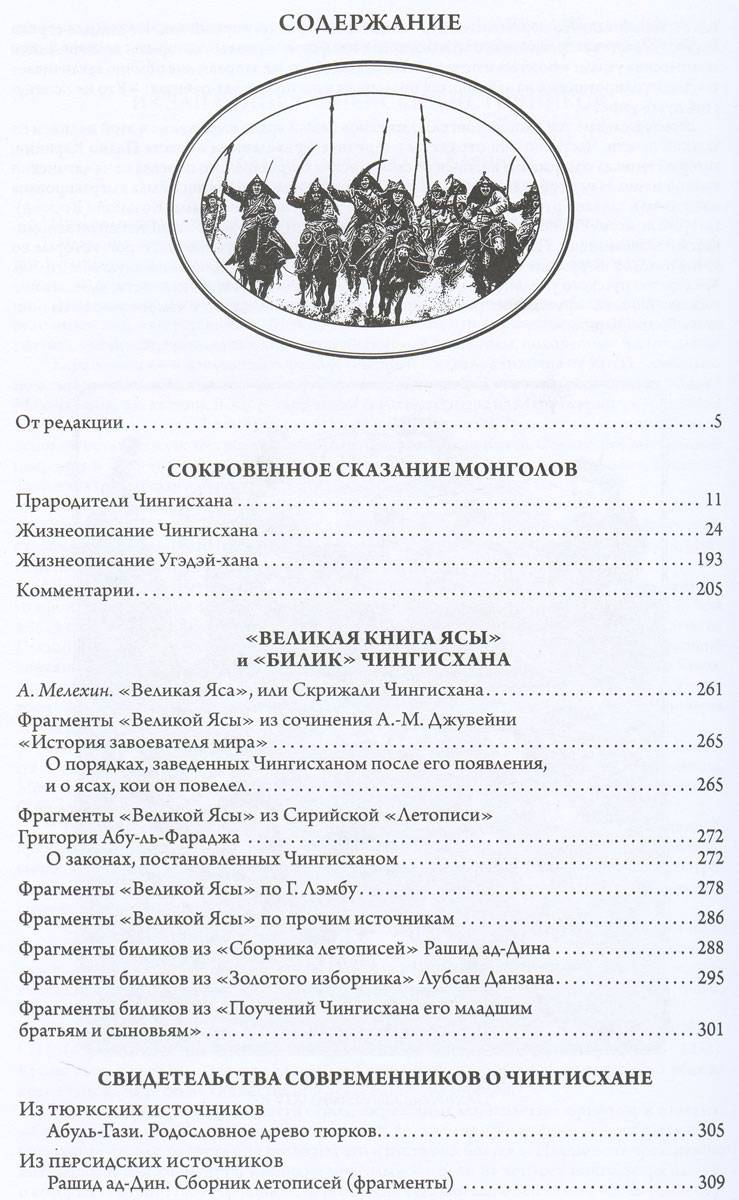
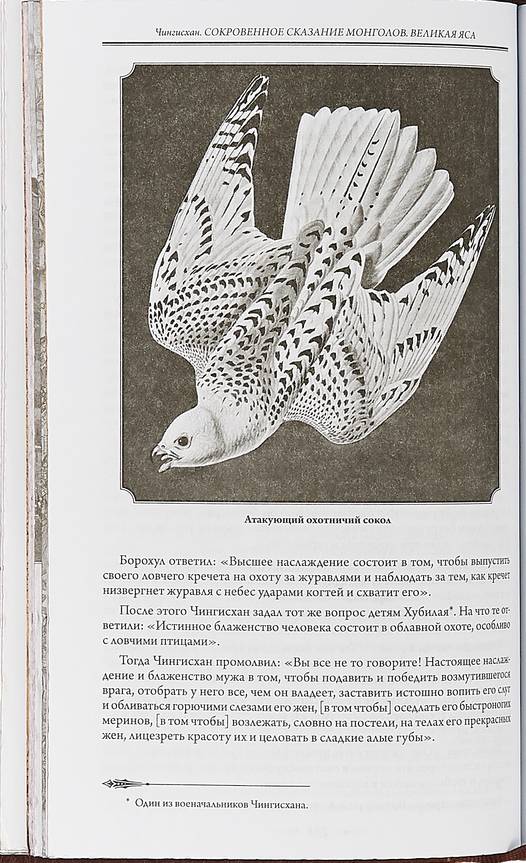
At the beginning of 1218, Genghis Khan sent his ambassadors to Khorezm, who conveyed to Muhammad II a very friendly, but at the same time, a provocative message:
Addressing Muhammad as a "son", albeit the "dearest", Genghis actually offered him to admit himself to be his vassal. Of course, this letter provoked the wrath of Muhammad.
This was followed by the so-called “Otrar disaster”: Genghis Khan sent a trade caravan in which 450 people were accompanying 500 loaded camels was plundered by the governor of the Sultan Kair Khan, who accused the merchants of spying.
An-Nasavi claims that the Khorezmshah merely ordered him to detain the caravan workers until further notice, but he exceeded his authority, and his main motive was elementary robbery:
And here is Ibn al-Asir in the Complete Code stories"Actually declares Muhammad II an accomplice in this crime:
Rashid ad-Din:
Kayr Khan, according to the order of the (Sultan) killed them, but (thereby) he ruined the whole world and dispossessed the whole people. "
It is possible that the scouts of the Mongols really came with the merchants, but this, of course, did not give grounds for open robbery and, especially, murder. However, the temptation to “warm your hands” was too great.
After that, the ambassadors of Genghis Khan came to the Khorezmshah, who delivered the letter of the conqueror. According to the testimony of Ibn al-Asir, it said:
Khorezmshah did exactly what Genghis Khan wanted: now he had a legitimate and understandable reason for the war for all his subjects: the killings of the ambassadors were not forgiven by the Mongols.
Gumilev once wrote that diplomats of all the nations of the world should erect a monument to Genghis Khan, since it was he and his heirs who taught everyone the principle of personal inviolability of ambassadors. Before his conquests, their murder was considered a matter of routine, and the revenge of the Mongols for their death was considered literally as savagery and a sign of uncivilization.
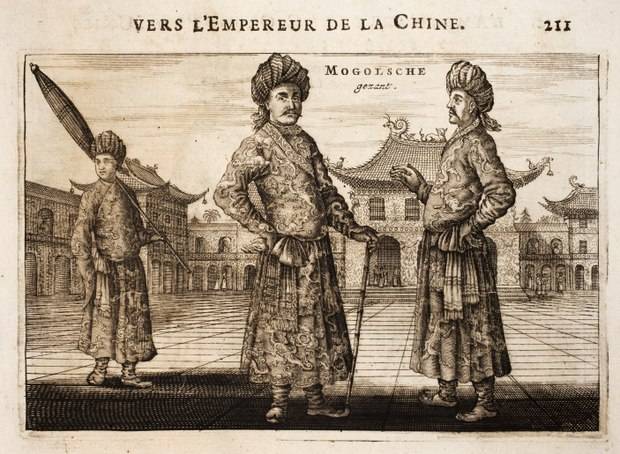
Genghis Khan also had another reason for the war, already personal: his brother Khasar, after a quarrel with the khan, migrated to the possession of Muhammad, where he was killed by someone. Relations between the brothers were very tense, even hostile, but nobody canceled the blood feud in Mongolia.
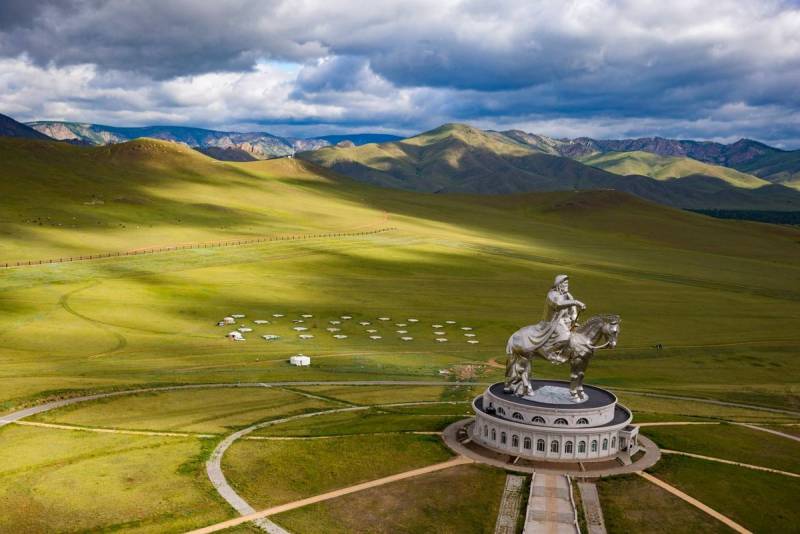
Battle of the Turgai Valley
In 1218, reconnaissance was conducted in battle. Formally, the army of the Mongols was led by the eldest son of Genghis Jochi, but Subadei had real power over the army.
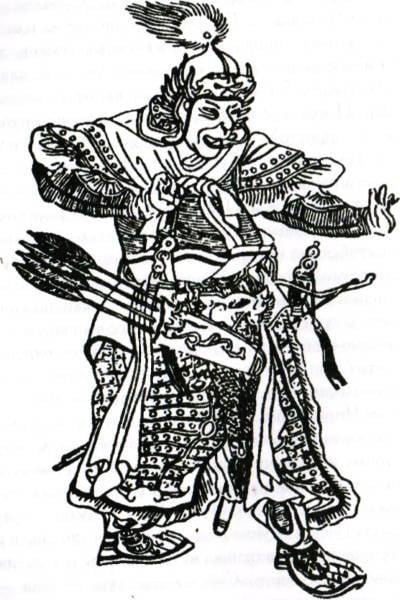
Pursuing the Merkits running before them, the Mongols entered the borders of Khorezm. There were only 20-25 thousand people, Muhammad led the army to 60 thousand.
As usual, before the battle, the Mongols tried to enter into negotiations. The scheme was standard, it will be applied many more times: Jochi said that he had no order to fight with the Khorezm army, the purpose of his campaign was to defeat the Merkits, and in order to maintain friendship with Muhammad, he was ready to give all the booty captured by his army. Muhammad answered in much the same way as many others answered the Mongols, with the condition of local specificity, of course:
(An-Nasawi.)
Thus began the battle on the Turgai Plain (which V. Yang in his novel called the battle of the Irgiz River), and soon there was no trace of the self-confidence of Muhammad.
There are two versions of the course of this battle. According to the first, the right wings of the opposing armies simultaneously hit the left flanks of the enemy. The Mongols fled the left wing of the Khorezmians, and their center where Muhammad was already was crushed. Here is what Rashid ad-Din reports about this battle:
Ata-Melik Juvaini in the work “Genghis Khan. The history of the conqueror of the world ”reports:
On the other, the Mongols struck the main blow in the center, completely collapsing it and almost captivating Khorezmshah himself.
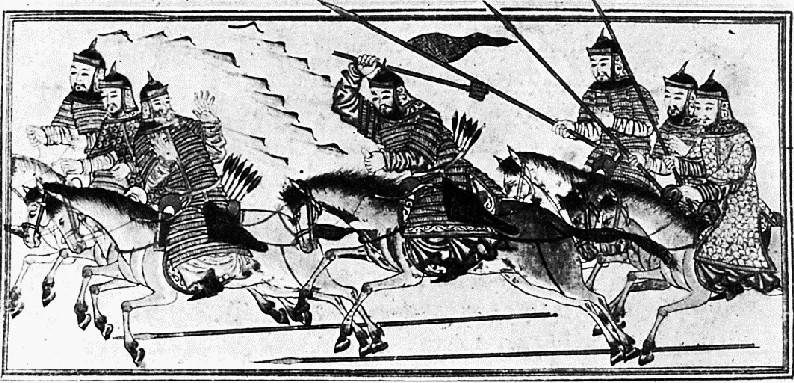
All authors agree that only the bold and decisive actions of Jalal ad-Din, who also achieved success in his field, did not allow the Mongols to defeat the Khorezm army. According to the first of these versions, his units dealt a slanting blow on the flank of the advancing Mongols, and on the second, a straight line in the direction of the center.
Rashid ad-Din:
Ata-Melik Juvaini:
The outcome of the battle has not yet been decided, one of the Arab authors evaluated it this way:
At the night council, the Mongols decided that to continue the battle, losing people, does not make sense. The victory did not give them anything, since there was no question of a further attack on the possessions of Khorezmshah with such small forces. And they tested the fighting qualities of the Khorezm army, and, as subsequent events showed, they rated them not too highly. That same night, leaving burning fires in their camp, the Mongols went east.
But almost captured Muhammad II was very scared. Rashid ad-Din wrote:
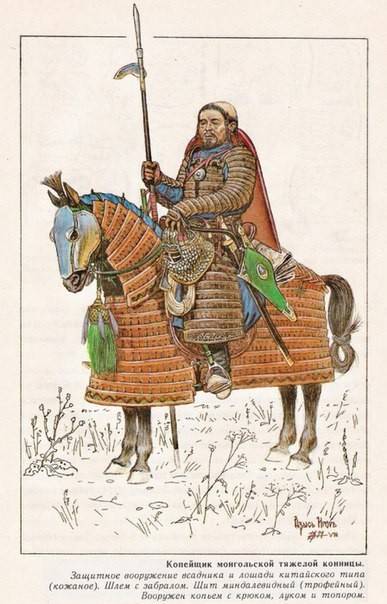
It is this fear that explains the actions of Muhammad during the next year’s military campaign.
Rashid ad-Din:
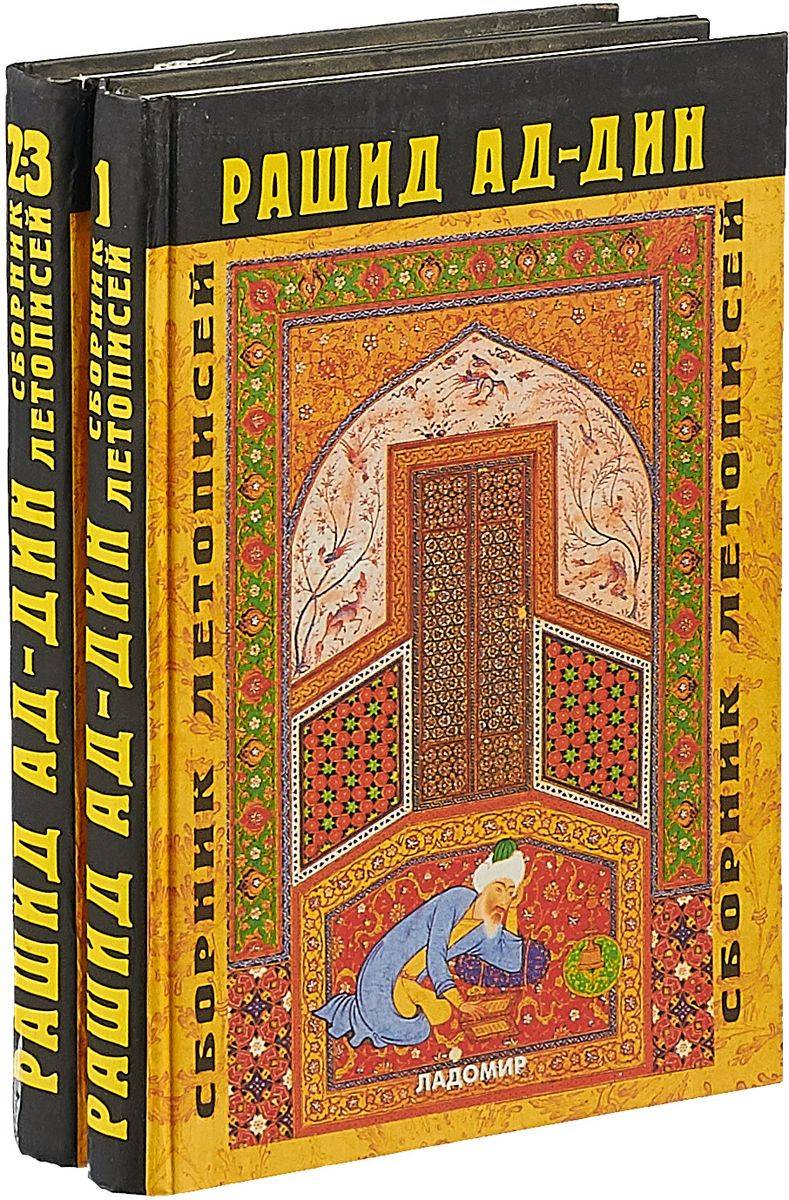
So, Genghis Khan began to prepare for the invasion of Khorezm. According to modern estimates, Chinggis was able to send an army to 100 of thousands of people on this campaign, while the total number of troops of Muhammad II reached 300 of thousands. However, until recently, so brave, and now scared to death, Muhammad refused a new battle in the open field
He dispersed part of the soldiers over the garrisons of the fortresses, part - he led away behind the Amu Darya. His mother and wives went to the mountain fortress of Ilal in Iran. Having ordered to protect only big cities, Muhammad, in fact, gave Genghis Khan the best and richest part of the country. He hoped that having plundered enough, the Mongols with their prey would go to their steppes.
Muhammad did not know that the Mongols had already learned to take cities well. Moreover, “military experts” of the conquered countries actively helped them in this. The Zhurzhenets Zhang Rong commanded military engineers; the Khitan Sadarkhai (Xue Talahai) led stone-throwers and ferry builders.
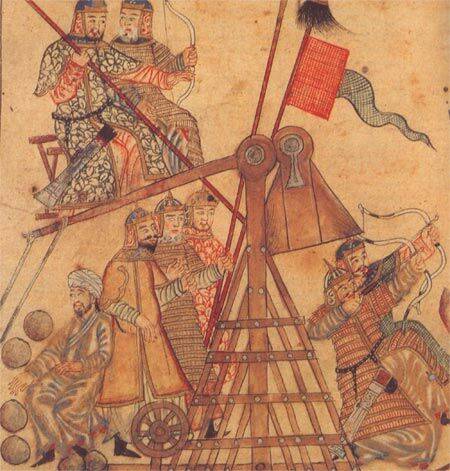
And the Chinese military taught the Mongols the method of the siege of the cities “hashar” (“crowd”), according to which during the assault, prisoners and civilians should be driven in front of themselves, as a human shield. The Mongols began to call a hashar not only a given military device, but also this forced contingent, whose members were also used as porters and laborers.
As a result of this fateful decision of the fearsome Muhammad, the Mongols got the opportunity to break the superior forces of the Khorezmians in parts, ruining Transoxiana (Maverannahr) with impunity, and gaining prisoners they needed so much for hashar. One can imagine what a heavy impression this made on the defenders of the fortresses, and how much it affected their morale and fighting spirit.
Muhammad al-Nasawi, “Biography of Sultan Jalal ad-Din Mankburn”:
Ata-Melik Juvaini claims that Jalal ad-Din was against such a war plan:
("Genghis Khan. History of the conqueror of the world.")
Timur-Melik, the commander of the Khorezmshah (who will soon become famous for the defense of Khojend), told him:
Muhammad II remained adamant, and did not change his decision.
Rashid ad-Din testifies:
He ordered the rebuilding of the fortress wall in Samarkand. Once he went over the moat and said: "If every soldier throws his whip out of the army that is against us, then the moat will fill up at once!"
Citizens and the army from these words of the Sultan became discouraged.
The sultan went on the road to Nahsheb, and everywhere he went, he said: "Get out yourself, because resistance to the Mongol army is impossible."
He:
Sultan Muhammad, due to extreme (his) confusion and intimidation, did not (heed) him and considered ... the son’s opinion was child’s fun. ”
Ibn al-Asir:
Having done this, he went to Khorasan, crossed the Jaihun (Amu Darya) and became a camp near Balkh. As for the infidels, they prepared and moved to capture Maverannahr. "
The Mongol invasion of Khorezm will be described in the next article.
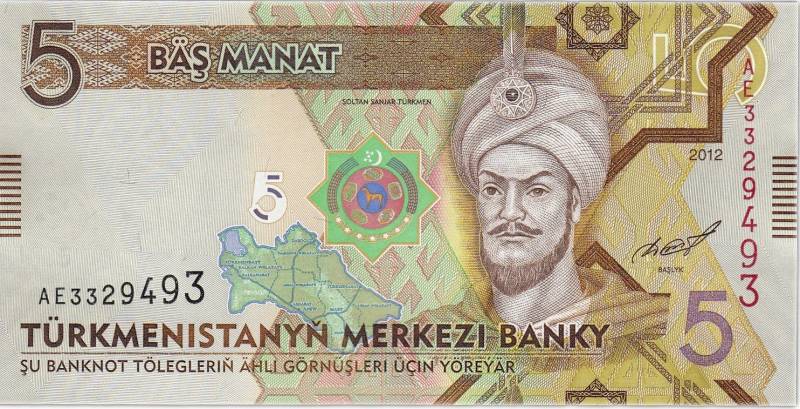
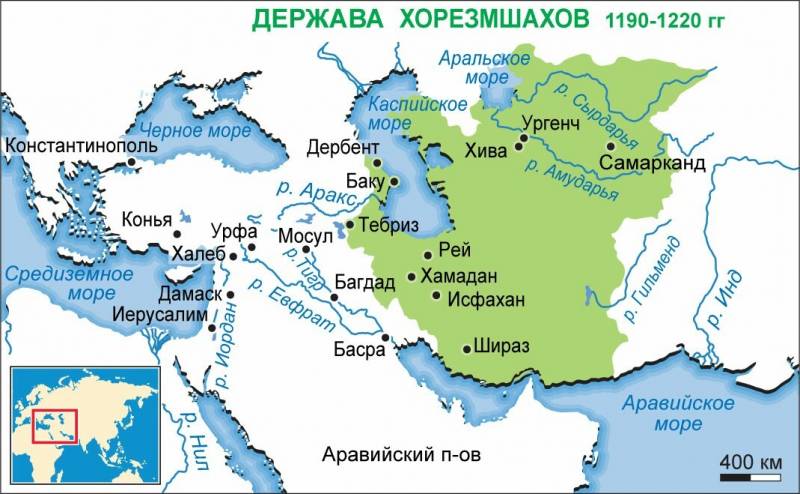
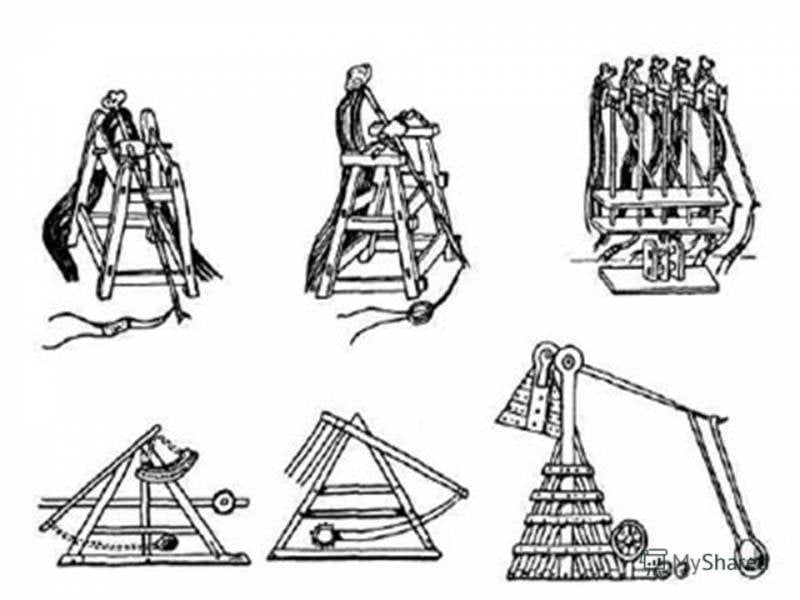
Information